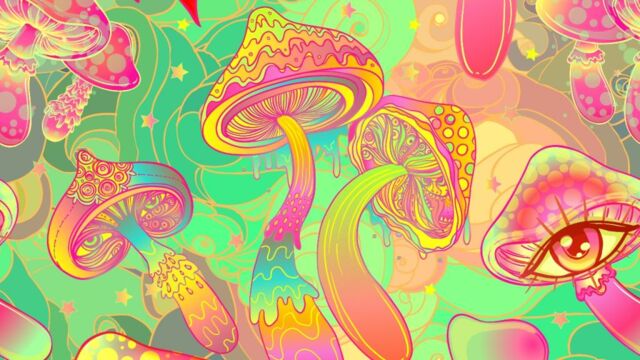Psychedelics: The next big thing for mental health treatment

In conversation with Gentside is Matt Stang, who is driving the 'psychedelic renaissance' with his brand Delic Corp.
Back in the 50s, scandalous letters written by the founder of Alcoholics Anonymous (AA), Bill Wilson, revealed that he was experimenting with a hallucinogenic substance called LSD to help him with depression. The revelation shook the community—how could a recovering alcoholic risk getting addicted to yet another drug?
Discover our latest podcast
Wilson quit the AA governing body to quietly examine the positive effect that LSD was having on his mental health. He wrote in a letter to philosopher Gerarld Heard:
More under this adMore under this adI am certain that the LSD experiment has helped me very much. I find myself with a heightened colour perception and an appreciation of beauty almost destroyed by my years of depressions.
The narrative that psychedelics have substantial healing powers that can treat mental illnesses was quickly abandoned by society. But researchers and scientists have been working meticulously behind the scenes to prove what they’ve known for years. When used responsibly and in moderation, psychedelics have the ability to brighten your life and to rehabilitate your mind. And recent studies have been showing that these substances could be a far more effective alternative to existing pharmaceutical medication.
More under this adMore under this adNow, in the 21st century, educational institutions, lawmakers, businessmen, and everyday folks are finally beginning to understand the transformative power of psychedelics in the world of mental health. While the consumption of psychedelics is still illegal in many parts of the world, the conversation is slowly starting to shift.
At the forefront of this revolution is a man who is paving the way for psychedelic wellness and therapy in the United States—Matt Stang.
More under this adMore under this adDriving the renaissance
Before pioneering the psychedelic renaissance, Stang spent 17 gruelling years pushing the cannabis movement with High Times, a magazine and cannabis brand that advocates the legalisation of marijuana. Now that two-thirds of the American population are all for marijuana legalisation, he’s moving on to the next big thing. Psychedelics.

Stang co-founded psychedelic wellness brand Delic Corp, alongside his wife Jackee, to bring psychedelics into the mainstream. He is not only using science to rewrite the narrative of these substances, he is also making psychedelic wellness accessible to everyone who is struggling with mental health diseases. He says:
These substances that we were treating like ‘problem children’ sixty years ago are now probably humanity’s best hope for coping with mental illness.More under this adMore under this ad
We built a company to really push mainstream acceptance of those psychedelic substances to help with people’s mental wellness.
At the moment, ketamine—a medication used for anaesthesia and pain relief—is the only legalised psychedelic in the United States and Stang runs a chain of ketamine infusion centres that medicates patients with a range of mental health issues from anxiety to post-traumatic stress disorder (PTSD), mood disorder, and obsessive-compulsive disorder (OCD). But now he’s making room for something bigger and possibly even better, psilocybin.
More under this adMore under this adThe magic mushroom compound that’s changing the game
Psilocybin is a psychedelic compound that is found in magic mushrooms and it’s giving existing pharmaceutical antidepressants a run for their money. A small study in the Imperial College of London recently found that psilocybin might be as effective in treating depression as common antidepressants, if not more. A separate study at Johns Hopkins revealed that a whopping 80% of their patients reported that their cancer-related depression and anxiety symptoms faded after receiving synthetic psilocybin.

With world-class institutions heavily investing in research for psychedelics in mental health, it has forced lawmakers to rethink their policies on drugs as well. In 2020, Oregon was the first state in the US to legalise therapeutic use of psilocybin, while Canada authorised psilocybin treatments to help end-of-life patients deal with anxiety and depression.
Taking full advantage of this progression, Stang has been developing his own psilocybin products at a Delic lab in Canada—including an innovative psilocybin vape.
More under this adMore under this adWe’ve been doing some research projects around vaporisation and inhalable delivery of psilocybin, cutting out the ingestible and making it a direct inhalable form which would then cut the time, length, and duration of the psychedelic experience.
He’s also been working on an array of different wellness-based psychedelic products that he can eventually integrate into his centers as and when individual states sanction their therapeutic use.
More under this adMore under this adOn a bigger mission
With one part of Delic Corp developing products for mental health patients, the other half is working on alarger mission—changing the public perception of psychedelics by taking the conversation closer to home. He says:
You have a discussion that touches everyone. When you talk about mental health, twenty percent of the population suffers from some form of mental health issue. It means that every person has someone that’s close to them that has an issue.More under this adMore under this ad
He hopes that by building a chain of psychedelic assisted clinics around the country, communities will be able to witness their very own benefit from this alternative form of therapy. He continues:
That just changes everyone’s perception because now it’s not a faceless, nameless person. It is your cousin, your aunt, or your best friend.More under this adMore under this ad
And for those who are just not convinced, he’s using science to get them over the ‘tipping point.’ Stang adds:
If you can show real science being done by real scientists just looking for answers to questions without any internal bias, you end up converting people who wouldn’t otherwise believe this.